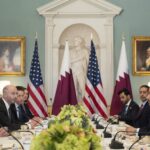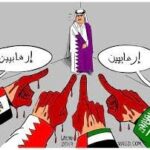In recent months, the tiny Gulf state of Qatar has found itself in the international spotlight, serving as a critical intermediary in resolving complex regional conflicts. From facilitating the release of hostages held by Hamas to brokering deals between the United States and Iran, Qatar has established itself as a key player in the Middle East’s complex diplomatic landscape.
Qatar’s Mediation Efforts with Hamas
Qatar’s involvement in mediating the release of hostages held by the Palestinian militant group, Hamas, has drawn significant attention. The global community has closely watched as Qatar, with its wealth and diplomatic prowess, has successfully secured the release of several hostages. Western leaders, including US President Joe Biden, have expressed gratitude for Qatar’s role in facilitating these releases.
The significance of Qatar’s involvement in this process cannot be overstated. Qatar has been hosting Hamas’s political office since 2012 and has poured substantial financial aid into Gaza. These actions place Qatar in a unique position, as it maintains good relations with both the United States and Iran, two countries often at odds in the Middle East.
However, the October 7 attack by Hamas, which triggered a war with Israel, has raised questions about Qatar’s willingness to host the political leadership of an Islamist group that has been involved in acts of violence and terrorism. While Qatar’s mediation efforts have been successful in securing hostage releases, the country faces the challenge of balancing its diplomatic role with concerns over its and reputation image.
Qatar’s Broader Diplomatic Initiatives
Qatar’s involvement in international mediation efforts extends beyond its role in the Hamas crisis. Over the past decade, the country has actively positioned itself as a mediator, willing to engage with actors that others might be reluctant to talk to. Qatar sees its diplomatic efforts as integral to its national security strategy, given its position in a volatile region surrounded by larger neighbors. These initiatives align with Qatar’s aspiration to play a more prominent role on the global stage.
Notable examples of Qatar’s mediation efforts include hosting an office for the Taliban since 2013, which played a vital role in evacuating Afghans who worked for the US and coalition entities during the chaotic withdrawal from Afghanistan. Qatar also facilitated a prisoner exchange deal between the US and Iran, leading to the unfreezing of $6 billion of Tehran’s oil money. The funds are now being monitored to ensure compliance with sanctions. Additionally, Qatar has engaged in secret talks between the Biden administration and Nicolás Maduro, seeking to mediate an agreement that could lead to free and fair elections and the release of political prisoners in Venezuela.
Challenges and Controversies
While Qatar’s diplomatic efforts have earned recognition from Western governments and international organizations, they have not been without controversy. The recent Hamas-led assault and subsequent criticism of Qatar’s association with the group have thrust the country into a highly charged and polarizing crisis. This crisis has put pressure on Qatar to navigate its role carefully, as the Israel-Palestine question remains a highly sensitive and contentious issue.


Critics have accused Qatar of sponsoring and financing Islamist groups in the region, a charge that was part of the justification for the 2017 regional embargo imposed by Saudi Arabia and the United Arab Emirates. Qatar has consistently denied these allegations and emphasizes its efforts to maintain open channels of communication to build trust and resolve differences.
Qatar’s Relationship with Hamas: Pragmatic or Problematic?
Qatar’s relationship with Hamas is often described as pragmatic rather than ideological. The country’s hosting of Hamas’s political leadership is seen as a strategic choice aimed at maintaining influence and control over the group, preventing it from becoming beholden to other actors in the region. This approach may provide some advantages in terms of diplomatic leverage, but it also carries the risk of being perceived negatively by other nations and international actors.
As Qatar continues to play a pivotal role in regional diplomacy, the question remains as to whether the pressure and criticism it faces over its ties to Hamas will intensify over time. For Qatar, navigating the delicate balance between diplomatic engagement and potential reputational risks will be an ongoing challenge.

